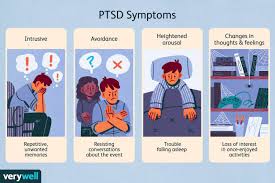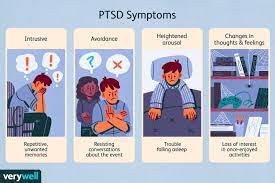Understanding PTSD: Symptoms, Causes, and Treatment
Post-Traumatic Stress Disorder (PTSD) is a mental health condition that can develop after experiencing a traumatic event. It is important to recognize the symptoms of PTSD and understand its causes to provide appropriate support and treatment for those affected.
Symptoms of PTSD
The symptoms of PTSD can vary from person to person but generally include:
- Flashbacks or intrusive memories of the traumatic event
- Nightmares or severe anxiety
- Avoidance of reminders of the trauma
- Negative changes in mood or thoughts
- Hyperarousal, including being easily startled or feeling tense
Causes of PTSD
PTSD can be caused by a variety of traumatic events, such as:
- Combat exposure
- Natural disasters
- Serious accidents
- Physical or sexual assault
- Witnessing violence or death
Treatment for PTSD
Treatment for PTSD often involves a combination of therapy and medication. Common treatment approaches include:
- Cognitive Behavioral Therapy (CBT): Helps individuals change negative thought patterns and behaviors related to the trauma.
- Eye Movement Desensitization and Reprocessing (EMDR): A therapy that helps process traumatic memories using bilateral stimulation.
- Medication: Antidepressants or anti-anxiety medications may be prescribed to help manage symptoms.
- Social Support: Building a strong support network can also be beneficial in coping with PTSD.
If you or someone you know is experiencing symptoms of PTSD, it is important to seek help from a mental health professional. With proper treatment and support, individuals with PTSD can learn to manage their symptoms and improve their quality of life.
Top 5 Frequently Asked Questions About PTSD
- What are the common symptoms of PTSD?
- What causes PTSD?
- How is PTSD diagnosed?
- What are the available treatments for PTSD?
- Is PTSD curable?
What are the common symptoms of PTSD?
Individuals with PTSD may experience a range of common symptoms that can significantly impact their daily lives. These symptoms often include intrusive memories or flashbacks of the traumatic event, nightmares, severe anxiety, avoidance of reminders associated with the trauma, negative changes in mood or thoughts, and heightened arousal such as being easily startled or feeling on edge. Recognizing these symptoms is crucial in identifying and addressing PTSD effectively to provide appropriate support and treatment for those affected.
What causes PTSD?
Post-Traumatic Stress Disorder (PTSD) can be caused by experiencing or witnessing a traumatic event that threatens one’s safety or well-being. Common triggers for PTSD include situations such as combat exposure, natural disasters, physical or sexual assault, serious accidents, and witnessing violence or death. The intensity and duration of the traumatic event, as well as individual factors like previous trauma exposure, coping mechanisms, and support systems, can also contribute to the development of PTSD. It is important to recognize that PTSD is a complex mental health condition with multifaceted causes that vary from person to person.
How is PTSD diagnosed?
PTSD is typically diagnosed through a thorough evaluation by a mental health professional, such as a psychologist or psychiatrist. The diagnostic process for PTSD involves assessing the individual’s symptoms, medical history, and any traumatic experiences they have undergone. The criteria outlined in the Diagnostic and Statistical Manual of Mental Disorders (DSM-5) are often used to determine if someone meets the criteria for a PTSD diagnosis. This may include experiencing specific symptoms for a certain duration and the impact these symptoms have on the individual’s daily life. Additionally, psychological assessments and interviews may be conducted to further understand the individual’s experiences and tailor an appropriate treatment plan. If you suspect you or someone you know may have PTSD, it is important to seek help from a qualified professional for an accurate diagnosis and appropriate support.
What are the available treatments for PTSD?
When it comes to treating Post-Traumatic Stress Disorder (PTSD), there are several available treatments that can help individuals manage and overcome their symptoms. Common treatments for PTSD include therapy, such as Cognitive Behavioral Therapy (CBT) and Eye Movement Desensitization and Reprocessing (EMDR), which aim to address negative thought patterns and process traumatic memories. Medications, such as antidepressants or anti-anxiety drugs, may also be prescribed to help alleviate symptoms. Additionally, building a strong support network and engaging in self-care practices can play a crucial role in the treatment of PTSD. It is important for individuals with PTSD to work closely with mental health professionals to determine the most effective treatment plan tailored to their specific needs.
Is PTSD curable?
The question of whether PTSD is curable is a common concern for individuals affected by this mental health condition. While there is no definitive “cure” for PTSD, it is important to understand that with proper treatment and support, individuals can learn to manage their symptoms effectively and improve their quality of life. Various therapeutic approaches, such as cognitive behavioral therapy (CBT), eye movement desensitization and reprocessing (EMDR), and medication, have been shown to be effective in helping individuals cope with PTSD symptoms. Additionally, building a strong support network and practicing self-care strategies can contribute to long-term recovery and well-being for those living with PTSD. It is essential for individuals experiencing PTSD to seek help from mental health professionals who can provide personalized treatment plans tailored to their specific needs.



